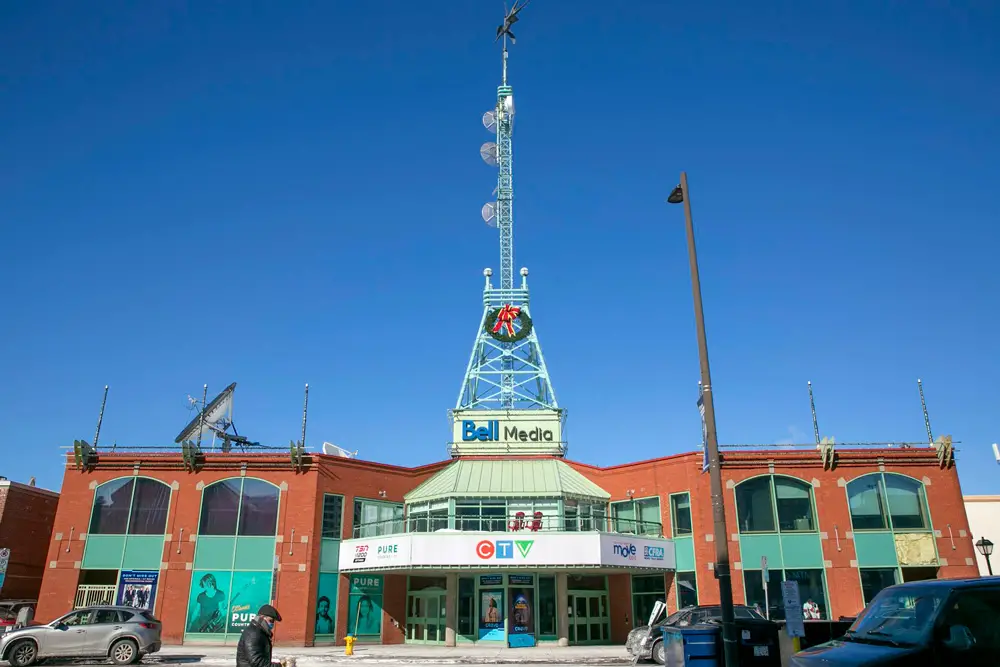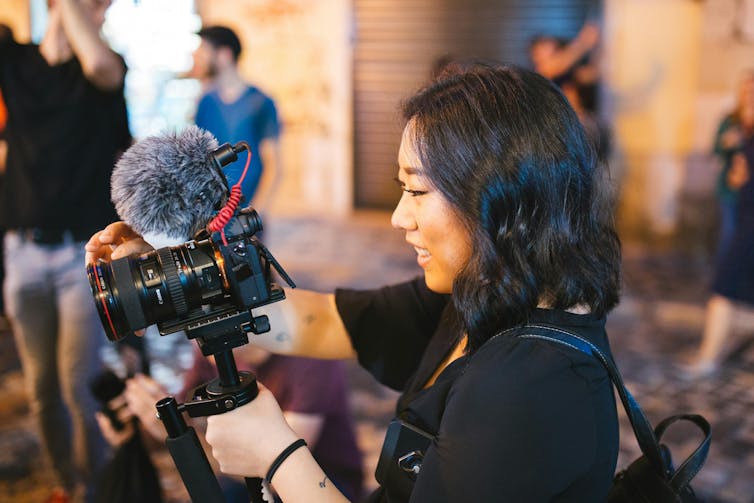
By Trish Audette-Longo and Christianna Alexiou
It’s hard not to see the journalism industry as one in crisis.
In February, Bell Media announced it was ending multiple CTV newscasts, making other programming cuts and selling 45 radio stations. Its parent company, BCE Inc., also announced it is cutting 4,800 jobs “at all levels of the company,” saying fewer than 10 per cent are at Bell Media.
Weeks later, Vice Media said it would stop publishing on Vice.com and lay off hundreds.
These decisions followed CBC’s December 2023 announcement that it would cut 600 positions, and news last fall that some Canadian journalism schools had shut down or paused their programs.
Across the country, the outlook for the future of news is — at best — uncertain. Not talking about the state of the industry is not an option for journalism educators.
In journalism school, students learn their craft while engaging with critical questions about their roles and responsibilities. They are often taught by previous or current journalists, whose work experiences prepare them to help students tackle reporting challenges.
Crises ask journalism educators, students and practitioners to grapple with sharing stories about what the future could hold. What will journalists’ jobs look like in five years? Or 25 years?
No one in any industry would be able to answer such questions with certainty. But critical events in journalism demand we talk through uncertain futures. And this presents follow-up questions. What are the risks and rewards of talking openly about precarity? How do you start a conversation when the future is so uncertain?
Understanding journalism education
In 2015, with the shock of the 2008 economic crisis still working through newsrooms, journalism educators offered a wide-ranging map for reevaluating the goals of journalism schools, and whether they are solely meant to train future journalists.
Crises run into each other, overlapping and informing responses to change. COVID-19 and a reckoning with racism in journalism and other institutions have demanded new reflections on journalism education.
Pathways to the future
It’s time journalism educators shift conversations with students, to address their experiences, their worries and their understanding of what journalism is and what they want it to be.
In 2022, we asked journalism students at Carleton University — where we, respectively, teach and studied — how they felt about their training through COVID-19. We were curious about how students viewed online learning and transitioning into journalism jobs.
What we heard were concerns about burnout, precarity, work-life balance and the long-term outlook for a life in journalism.
“I just feel like almost every week or every few weeks, I go on Twitter and there’s a journalist who’s like in their 30s or 40s, like halfway through their career, who just quit,” one student said.
Students knew the risks of going into the industry, thanks to news of other cutbacks, guest speaker testimonies and their own experiences losing internship opportunities when the pandemic forced newsrooms online.

(Shutterstock)
Anticipating challenges
We asked journalism students what they thought a day in the life of a journalist looked like. They talked about days that demanded endurance, dedication and working through different kinds of uncertainty.
“They’re just always on,” one student said. “I don’t think journalists have a normal day. As in, you know, get up, get to work, get home.”
Another student described “general burnout” as “a huge part” of the job.
It isn’t surprising that students anticipated challenges finding work and worried about long-term financial stability. In some ways, their responses align with a broader Gen-Z refusal to put their jobs at the centre of their lives or accept low pay.
“I don’t want to say, you know, the more money you make the more successful you are, but being able to just have that security is, I think, a huge thing,” one student said.
“Maybe it doesn’t quite align with ‘success’ in a ‘making a difference’ kind of way. But I think (financial security) gives you an ability to make a difference.”
Students also flagged the importance of mental health and well-being.
“There is an expectation that your entire life should revolve around chasing a story until you physically cannot anymore,” one student said, explaining that this kind of thinking turned them away from journalism.
Learning together
Today’s journalism students have likely been told their entire lives — by friends, family, pop culture and so many reports — that it’s a dying industry. Nonetheless, they’re driven to find out more.
Journalism in crisis, as others have argued, presents an opportunity to unpack traditions and reimagine practices.
It’s also an opportunity to reconsider how journalism schools and newsrooms respond to the concerns of emerging journalists. How can precarity and burnout be addressed collectively inside and outside journalism, not as individual matters?
One place this can begin is with classroom conversations, collectively taking on uncomfortable truths and fears alongside building new skills.

(Pexels/Fox)
Navigating not having reassuring answers
One risk, for educators, is not having ready-made, reassuring answers to questions of insecurity.
Introducing worst-case scenarios also risks scaring away students. In our interviews, one student cautioned against presenting guest speakers’ negative portrayals of the industry too early, for example.
But recent news makes industry crises impossible not to talk about.
Talking through crises can allow for discussion of alternatives and solutions. However, care should be taken to not romanticize what has worked in the past, including precarious conditions like long hours, low pay or competing for fewer and fewer jobs.
Instead, it’s helpful to think of imagining different journalism futures as an in-progress collaboration for students, educators, journalists and news organization leaders. Such collaboration is a project of articulating not only crisis conditions, but drawing on shared experiences to figure out what it would take to make things better.
Looking back, we wonder what responses and creative solutions we would have heard if we asked students what they wanted their days to look like as journalists — not just what they thought the job looked like already.
![]()
Trish Audette-Longo is Assistant Professor of Journalism Studies at Carleton University; Christianna Alexiou is MSc in Regulation Student at the London School of Economics and Political Science.






























mav says
It seems the journalism industry has turned into Shock and Awe. Case in point, Lets go back to 2002, Pet Research ” More than half of journalists surveyed (57%) say they are “extremely” or “very” concerned about the prospect of press restrictions being imposed in the United States. And about seven-in-ten journalists (71%) say made-up news and information is a very big problem for the country, higher than the 50% of U.S. adults who say the same. At the same time, four-in-ten journalists say that news organizations are generally doing a bad job managing or correcting misinformation.” Its all we as viewers get these days, negative news, far and few between feel good stories. ON TV, its all about the ratings, so shock and awe reins supreme for those rating awards and bonuses. Viewers are pretty much tired of having to come home from a day of work and set and watch negative depressing news. Or read about slanted views that directly drives negativity and hate regardless of how much truth can be presented. But that’s the news cultures these days and if that is driving displeasure in the journalism industry, in my opinion, well the industry did it to themselves. At least with on-line news, a person can click to an article that provides them some positivity or truth to suit their own views. If they don’t like it, click. Ya don’t need a TV news host to do that for you, but somehow someone somewhere has to report it and write it, and that’s never going to go away.
protonbeam says
I saw a PEW poll (or maybe a similar organization) recently – two “groups” with the lowest level of trust and like were politicians and then journalists. Can be interpreted widely I am sure – however people on every side and on every issue see the relentless “spin”, partisanship and opinion pieces masquerading as journalism – corporate newsroom have tarnished the industry.
Hippy says
For the most part journalism died long ago. The majority of what is called “news” reported by what is called a “journalist” is nothing more than an editorial / opinion piece… That is why “Journalism” is in crisis. People need and are wanting facts so they can decide for themselves. Until that starts again I consider Journalism dead….
The dude says
When there is the actual truth and then other “alternative truths” how does one report objectively?
That is THE question for journalists here in the age of MAGA and all it’s “alternative facts”…
Endless Dark Money says
Ah yes the entertainment “news” like fox not much truth or facts but lots of deceit. Magats gobble it up like your trash after a good rain. Enjoy the next overthrowing attempt of the government attempt this year. The fraud is trump and the ignorant will believe anything he says. late stage capitalism usually turns to fascism.
Ed P says
I would worry more about the massive numbers who get their news from TikTok…43% of the billion users. Makes Fox look small.
So you watch Fox and know what you speak of or just another over the top post?